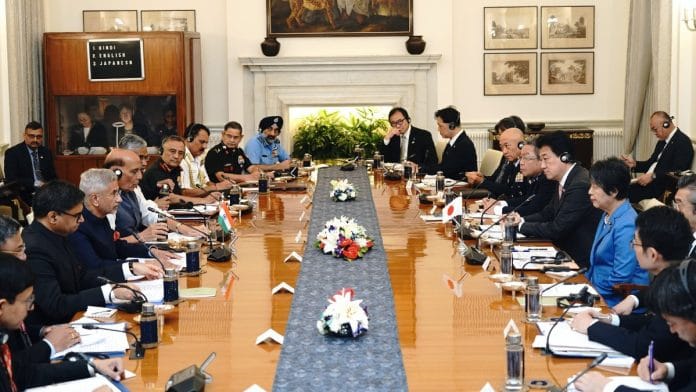New Delhi: The third India-Japan 2+2 ministerial meeting Tuesday focused on expediting talks on defence technology transfers, including Japan’s Nora-50 naval antenna, also known as “Unicorn”.
Discussions were also held over issues in the South China Sea and the ongoing war in Ukraine.
Prime Minister Narendra Modi, in a 65-minute meeting with Japan’s foreign and defence ministers Monday, conveyed the message that the India-Japan partnership is key to promoting “peace and stability” in the Indo-Pacific region. Modi also called for closer cooperation in areas of critical minerals, semiconductors and defence manufacturing.
The India-Japan 2+2 ministerial meeting was held after a gap of nearly two years, with the last edition held in Tokyo on 8 September 2022.
Addressing the press alongside Raksha Mantri @rajnathsingh, Foreign Minister @Kamikawa_Yoko and Defense Minister @kihara_minoru after the India-Japan 2+2 meeting in Delhi today.
?? ??
https://t.co/y44VU41are
— Dr. S. Jaishankar (@DrSJaishankar) August 20, 2024
At the 2+2 dialogue, India was represented by External Affairs Minister S. Jaishankar and Defence Minister Rajnath Singh. Japan was represented by Foreign Minister Kamikawa Yoko and Defence Minister Minoru Kihara.
During the meeting, the ministers also highlighted India’s decision to establish a new consulate in Fukuoka, bringing the total number of Indian missions in Japan to three. Japan currently has five missions in India.
Also Read: Delhi-Tokyo 2+2 dialogue to counter Beijing & what’s driving India’s ports expansion — global media
Quad & Indo-Pacific
The latest India-Japan 2+2 meeting comes ahead of the Quad Leaders’ Summit expected to be held in India this year though it was postponed after being initially slated for January this year.
In a joint statement Tuesday, both countries reaffirmed their commitment to advancing the Quad, a month after foreign ministers of the grouping met in Tokyo.
In the joint statement, the ministers highlighted their common strategic vision towards a free and open Indo-Pacific. “The Ministers further concurred on deepening bilateral cooperation in the field of space and cyber. They reaffirmed the importance of multilateral defence cooperation and exchanges in the Indo-Pacific region,” it stated.
However, there was “no decision” on the date of the Quad Leaders’ Summit, Nakada Yosuke, Second Secretary at the Embassy of Japan in India, said in a press briefing Tuesday night.
‘Root out terror safe havens’
In the joint statement, the two counties “unequivocally” condemned terrorism. The statement also called for bringing the perpetrators of 26/11 Mumbai terror attack, Pathankot, and other attacks “to justice”.
It also called for concerted actions against all UN-listed terrorist groups including Al Qaeda, ISIS/Daesh, Lashkar-e-Tayyiba (LeT), Jaish-e-Mohammad (JeM) and their proxy groups.
The statement also underlined the need to “root out terrorists’ safe havens, eliminate terrorist financing channels, and halt cross-border movement of terrorists”.
In his remarks to the press, Jaishankar said: “India and Japan are resolute in our opposition to terrorism, including cross-border terrorism…We have underlined our interest in deepening information-sharing, and cooperation for protection of critical information infrastructure.”
‘Unicorn’ & South China Sea
The need to deepen India-Japan defence cooperation, participation in more joint defence exercises and expediting talks on transfer of defence technologies, including Japan’s ‘Unicorn’ naval communication antenna, were also discussed during the 2+2 ministerial meeting Tuesday.
During the talks, Kihara cited Japan and India’s first joint fighter jet exercise as a step in the right direction, according to Yosuke. In January last year, the Japan Air Self Defence Force (JASDF) and Indian Air Force (IAF) held their maiden bilateral air exercise ‘Veer Guardian 2023’.
“We discussed the unfolding new avenues for technology, research and industrial cooperation between us as well. The growth of technology also necessitates human resource cooperation, semiconductors being a very good example,” said Jaishankar in his remarks to the media.
“This is crucial for our diversification and de-risking efforts, for our economic and technology security overall…,” he added.
According to Yosuke, the ministers also talked about the need to further accelerate the discussions on the transfer of ‘Unicorn’, the cutting-edge naval communication antennas for warships. Its ability to integrate multiple antennas is said to enhance a warship’s stealth capabilities.
In their talks, the ministers noted the progress made for the transfer of Unified Complex Radio Antenna (UNICORN) and related technologies and “early signing of related arrangements”.
“This is an integrated communication antenna for the naval ship… (and) transferring this technology and defence equipment is under consultations,” Yosuke told reporters in a telephonic press briefing.
Japan would like to consider cooperation for naval ships to be repaired in India, Yosuke added, explaining that this will enhance interoperability and help Japan become more militarily “flexible” in the South China Sea.
(Edited by Amrtansh Arora)
Also Read: China keeps making a strategic blunder—underestimating India’s role in Quad






